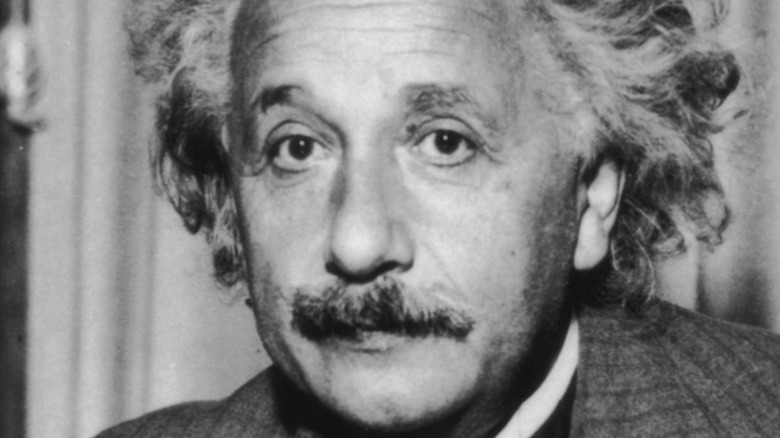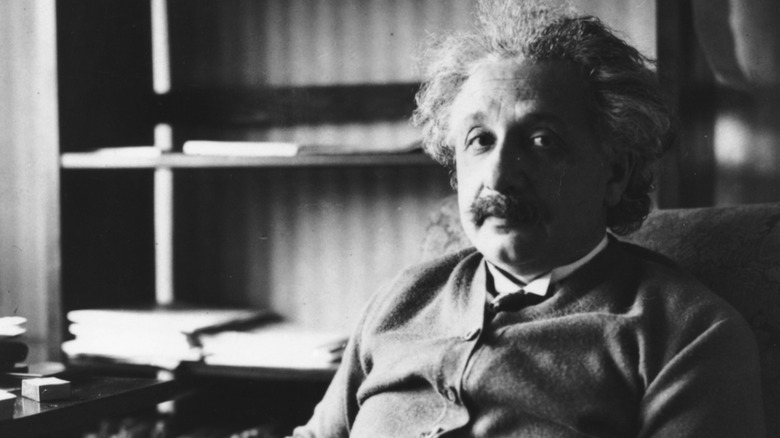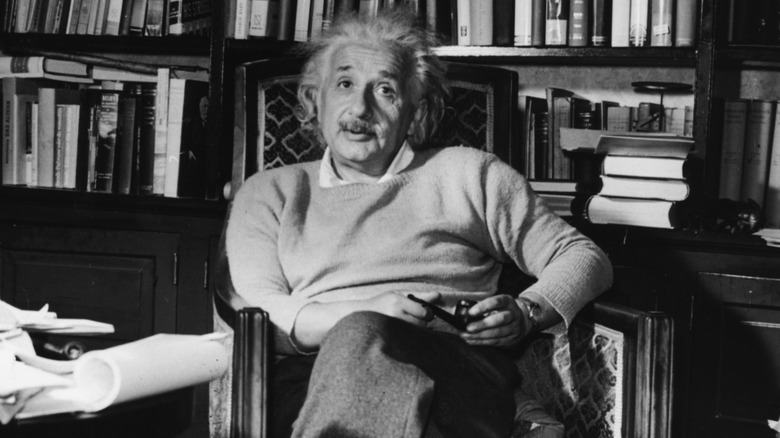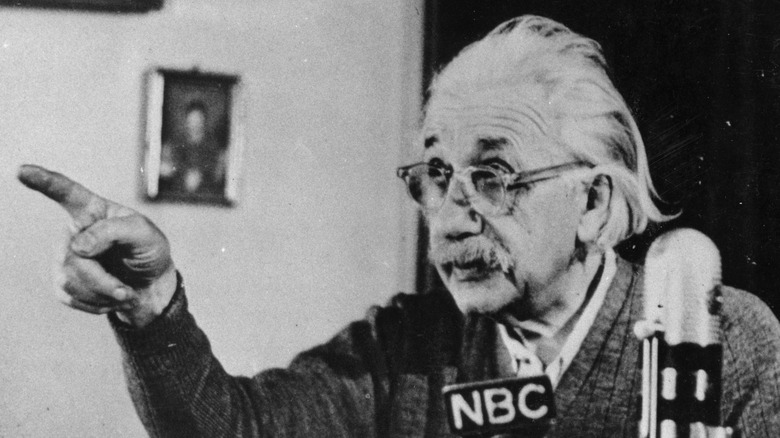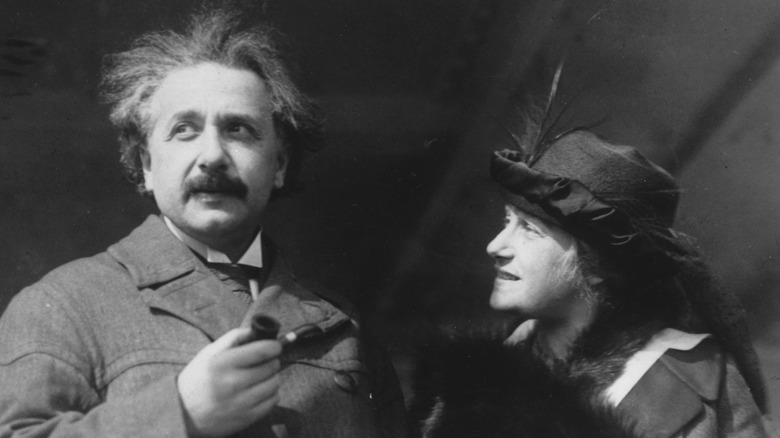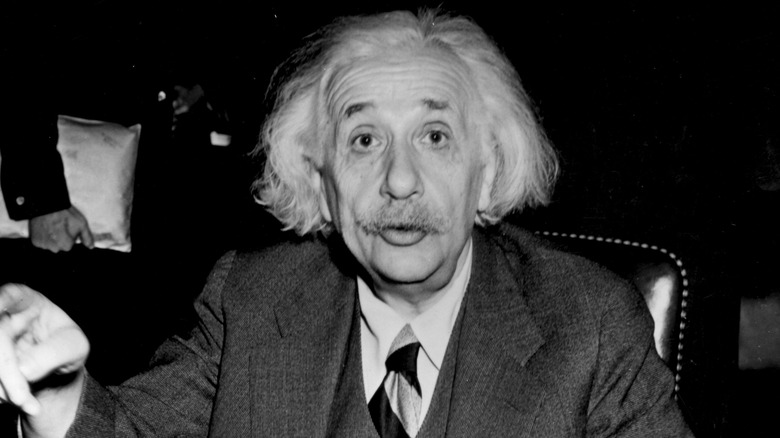How WWI Pushed Albert Einstein Into Politics
Most people know Albert Einstein for his brilliant contributions to science, including his discovery of the theory of general relativity and the E=mc² equation that helped win him the Nobel Prize in Physics in 1921 (via EarthSky). Time Magazine named Einstein the person of the century in 1999, stating he was the "embodiment of pure intellect." Today, Einstein is synonymous with genius.
Although there is a dark side of Albert Einstein, including some questions about how he treated his wife, he was largely heralded for his creative and groundbreaking work. However, despite his contributions to science, Einstein was not initially well-received by the U.S. government, which kept a 1,427 page FBI file on him and ultimately left him off the Manhattan Project during World War II because of his "extreme" politics (via National Geographic). But actually, it was World War I that pushed him into politics in the first place.
Einstein the pacifist
Einstein was born in Germany, but he left the country at 16 to avoid serving in the military, which was required of all young men at the time, according to the American Museum of Natural History. After renouncing his German citizenship, he went to Switzerland, where he became a citizen (via Atomic Heritage). A self-proclaimed pacifist, Einstein must have felt at home in neutral Switzerland. But after earning his PhD and publishing papers that would go on to win him the Nobel Prize, Einstein returned to Germany in 1914 to teach at the University of Berlin, according to the American Museum of Natural History.
Science was not separate from the war. In the early 20th century, the chemist Fritz Haber, who would go on to be named the father of chemical warfare, was already developing weapons in the lab (via Smithsonian Magazine). But Einstein was one of the few German academics who actually spoke out against the war at the time, paving the way for a future career in politics, per the American Museum of Natural History.
Einstein and Freud
In October 1914, four months after a Serbian soldier assassinated the Archduke Franz Ferdinand of Austria, the war began. At that time, Einstein's name was one of just four signatures in the Manifesto to Europeans sent out to protest the war in Germany (via the American Museum of Natural History). Most of his other colleagues in Germany supported the war, or at least did not stand up against it publicly as Einstein did.
Einstein, always the creative thinker, was curious as to how human beings philosophically or psychologically could commit war crimes. According to 1914-1918 Online, Einstein thought that perhaps men's sexual drive was behind the war efforts, leading him to write to the father of psychoanalysis, Sigmund Freud. Freud was one of the other academics who stood with Einstein to condemn World War I, and Einstein wrote a famous letter to Freud, musing on the reasons for war and their shared pacifism, according to the American Museum of Natural History.
Einstein for peace
Einstein was a huge fan of the anti-colonial nationalist Mohandas Karamchand Gandhi, once saying that he believed "Gandhi's views were the most enlightened of all the political men of our time," according to Wion News. In 1925, Gandhi and other peace-driven activists, including Einstein, signed a statement condemning the mandatory military service that Einstein avoided as a teenager in Germany, according to the American Museum of Natural History.
They wrote, "It is our belief that conscript armies, with their large corps of professional officers, are a grave menace to peace. ... Barrack life, military drill ... and deliberate training for slaughter undermine respect for the individual, for democracy, and human life," according to the American Museum of Natural History. This commitment to perpetuating peace would last until Einstein's death; he signed the Russell-Einstein Manifesto against nuclear weapons just a few days before he died in 1955, according to Waging Peace.
Einstein in World War II
After the war, Einstein's experience in Berlin as a professor made his anti-war sentiments even stronger. He watched people go hungry in the city, where infant mortality soared and the government lost much power, according to the American Museum of Natural History. Within two decades, as the Nazis and Adolf Hitler began coming to power in Germany, Einstein, who was Jewish, began to be faced with anti-semitic threats and abuse, according to Scientific American. Some of the books he had written were burned (via Scientific American).
In 1933, Einstein moved to the U.S. to teach in New Jersey, and became a citizen in 1940, according to Atomic Heritage. However, the U.S. government kept tabs on Einstein because of his prominent role and his history of speaking out against war and racism. In 1951, Einstein testified on behalf of W.E.B. Du Bois, and the U.S. government saw him as a potential communist for his civil rights activism, labeling him as an "extreme radical," according to National Geographic.
Einstein's letter
Through his connections in Germany, Einstein knew that German scientists were trying to invent the atom bomb, and he attempted to alert the U.S. government, according to the American Museum of Natural History. The government seemed to heed his advice, as they began work on the Manhattan Project that would — much to the dismay of Einstein — ultimately beat out Germany in the race to construct the atom bomb. Ironically, Einstein wasn't invited to work on the Manhattan Project because of his activism, per the American Museum of Natural History.
Einstein regretted sending the letter to then-President Franklin D. Roosevelt in 1939, since it's possible without the letter, the U.S. may have never, or at least not yet, invented the atom bomb, according to The New York Times. After the first atomic bombs were used, Einstein spoke out against them, saying the world was moving "toward unparalleled catastrophe" (via The New York Times). A pacifist at heart, it must have been a punch in the gut for Einstein to have taken any part in the making of the atomic bomb, even if it was tangential.
